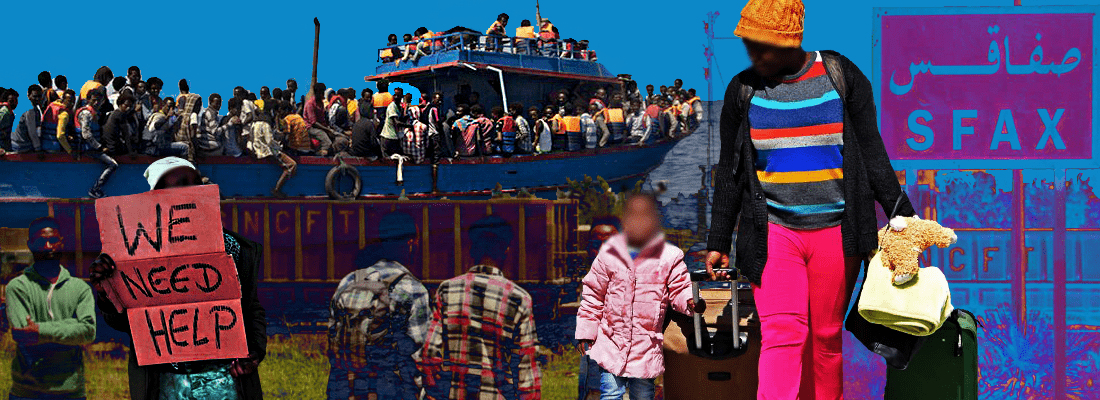This solidarity declaration by La Via Campesina stands firm against the troubling agreement signed on July 16 between the European Union and the Tunisian government, purportedly aimed at curbing ‘illegal’ migration.
This agreement offers financial incentives to the Tunisian government in exchange for controlling the migratory flow, a decision that is deeply concerning as it disregards the human rights of migrants and fosters animosity towards them.
The situation in Sfax, Tunisia, has reached a critical point since July 2023, with extreme tension surrounding migrants from various sub-Saharan African countries. Among the migrants are pregnant women, babies, and children who have faced violence and property theft, compelling them to flee their homes, which were set on fire due to rising tensions between migrants and the local population. Tragically, many of these migrants were abandoned in the desert, facing scorching temperatures and a lack of essential resources like water and food. This dire circumstance requires immediate rescue efforts to prevent further loss of lives.
Last week, thirteen migrants from the sub-Saharan region lost their lives at sea off the coast of Sfax, when their boat sank.
Furthermore, hate campaigns and racist rhetoric have only fueled public animosity towards immigrants, exacerbating tensions within communities like Sfax. These campaigns promote violence, often orchestrated, and alarmingly, some official authorities seem to tolerate these actions and even participate in intensive operations of arrests and forced deportations.
Despite being a transit country for migrants on their way to Europe, Tunisia resolutely refuses to be seen as an alternative solution for migrants. The European Union’s pressure on Tunisia has persisted, but the Tunisian state stands firm in welcoming only those in a legal situation, avoiding being perceived as a final destination for these individuals, that the majority of whom are rural migrants, peasants, breeders and landless. These people are forced to leave their country due to a lack of opportunities to lead a dignified peasant life. Among the factors contributing to their departure include land grabbing, problems of access to water, industrial trade policies that destroy local agriculture, as well as poverty and the lack of basic conditions for a decent and equitable life.
This migration crisis in Europe is closely linked to colonialism and imperialism in Africa. Centuries of exploitation and theft of natural and mineral resources have impoverished African countries, forcing many of their young people to flee poverty, famine and armed conflict. Once in Europe, these migrants often find themselves exploited as laborers in harsh conditions, particularly in industrial agriculture.
In light of this urgent situation, La Vía Campesina, a global movement of peasants, offers unwavering support to migrants and their families. We unequivocally condemn the geopolitical alliances formed by the EU with right-wing governments and migratory transit countries that criminalize migrants and neglect their fundamental rights.
Our declarations are as follows:
- We unequivocally condemn the geopolitical alliances formed by the EU with right-wing governments and migratory transit countries that criminalize migrants and neglect their fundamental rights.
- We strongly condemn the serious human rights violations faced by migrants, and categorically rejects any form of racial discrimination, aggression, persecution, ill-treatment, expulsion or forced displacement, whether faced by any person. It is essential to underline that UNDROP (United Nations Declaration on the Rights of Peasants and Other Rural Workers) also guarantees the protection of migrant workers, as stipulated in article 1 – point 4. This declaration also applies to salaried workers, including all migrant workers, whatever their migratory status, as well as seasonal workers on plantations, farms, forests, aquaculture farms, and in agro-industrial enterprises.
- We denounce incitement campaigns and racist speeches fueling hatred against people from sub-Saharan Africa, while also calling attention to the authorities’ silence and complicity in many cases.
- We reject mass and collective expulsions of refugees at the Tunisian-Libyan borders, recognizing them as grave threats to the lives of displaced individuals and flagrant violations of fundamental human rights.
- We urge the authorities to immediately cease campaigns of forced arrests and deportations, which blatantly violate human rights and international treaties signed by Tunisia, such as the 1951 Geneva Convention and the African Charter on Human and Peoples’ Rights.
- We refuse to allow Tunisia to become a border guard for the European Union under opaque agreements hidden from the public, serving the interests of unscrupulous governments with racist electoral agendas, where Tunisian immigrants themselves fall victim.

